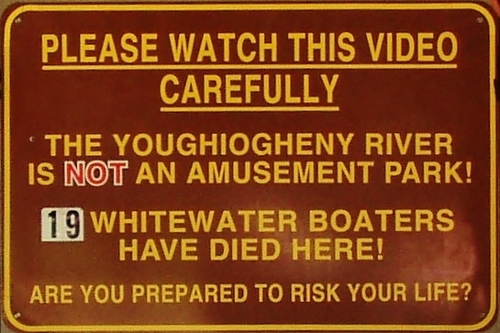
The Importance of Liability Waivers and Releases for Sports and Recreation Activities
Most companies or businesses that allow participants to engage in sports or outdoor activities (such as white water kayaking, whitewater rafting, adventure races, skydiving, SCUBA diving, rock climbing, mountain climbing, snow skiing, snowboarding, water skiing, sailing, camping, hiking, triathlons, and surfing) usually have all of the participants sign liability waivers or releases of liability. Because of the higher incidence of accidents and claims for such recreational or adventure activities, a liability waiver can be essential for organizations to limit their liability.

First, it is important to recognize that laws regarding the enforceability of waivers can be dramatically different between states. For example, Maryland‘s highest court (the Maryland Court of Appeals) has stated that liability waivers are valid and sufficient “to insulate the party from his or her own negligence as long as [its] language . . . clearly and specifically indicates the intent to release the defendant from liability for personal injury caused by the defendant’s negligence.” (Adloo v. H. T. Brown Real Estate, Inc.). However, Virginia‘s highest court has stated that Virginia’s public policy has long prohibited prospective releases of personal injury damages.(Hiett v. Lake Barcroft Community Assoc.). Further, many states have passed liability statutes and regulations that address restrictions of liability within specific sports and adventure activities (such as West Virginia regarding whitewater rafting). Thus, it is important to understand the states’ laws that will be applied to your organization’s activities.
Second, sports and outdoor companies need to understand that both the content and collection methods of liability waivers are critical to the waiver’s effectiveness. For example, in the absence of proper drafting, many liability waivers that have included a broadly written statement waiving liability by the participant (such as to generally hold a company harmless from any and all liability) have been deemed invalid by courts in many jurisdictions.
To highlight the liability waiver concerns as described above, here are a few examples of appellate courts addressing these waiver and release issues:
In the recent Maryland case of Rosen v. BJs Wholesale Club, the court addressed a liability waiver which was signed by parents (in advance) for a play center for the children of BJ’s Wholesale members to use while parents shop at the store. Fifteen months after a father signed a liability waiver, while his child was playing at the play center, the child fell head first and suffered a serious injury. The Rosen court ruled that a parent may not waive by agreement a minor child’s future claim in negligence against what we shall refer to as a commercial enterprise.'”
In the Oregon case of Bagley v. Mt. Bachelor, Inc. (decided two months ago), the court addressed a ski and snowboard resort that had participants sign a liability waiver to insulate Mount Bachelor for negligence in maintaining or installing its ramps or chairlifts. In Bagley, the court decided that the liability waiver presented by Mount Bachelor to Bagley (and which Bagley agreed to) was unconscionable. The court specifically ruled that the contract provisions in Mount Bachelor’s waiver were unambiguous and conspicuous and likely unenforceable in light of public policy. While winter-adventure seekers at Mount Bachelor (skiers and snowboarders) engage in a dangerous outdoor recreational activity, the court decided that the resort could not remove all liability for its own negligence.
In the West Virginia case of Murphy v. North American River Runners, Inc., the court addressed a rafting company that was sued by a whitewater rafting participant due to injuries stemming from a rafting trip on the New River. While liability was deemed waived for all rafting activities, the Murphy court ruled that the rafting company was potentially liable due to actions from the successful rescue of another raft. In Murphy, a raft guide positioned his raft to dislodge (through a bump) a distressed raft that was stuck in a river rapid. While the bump action successfully dislodged the troubled raft, a passenger in the rescuing raft was injured during the bump. The court ruled that liability was appropriate because the rescuing rafts passengers had not agreed to help another raft in distress.
In the Maryland case of Barber v. Eastern Karting Co., the court addressed a liability waiver which was signed by a participant at a go-kart racing event. The court specifically expressed concern that the waivers were only able to be signed and collected on site, at the gate-entrance to the facility holding the adventure activity. In this case the location of the signing of the waiver was important. In Barber, the court noted that waivers which were only available at the entrance to a go-cart event did not provide the participants with a fair choice to decide whether or not to waiver their rights. Thus, having waivers available for review/acceptance prior to an event/activity could be critical to the waiver/release being accepted by a court as proper.
In the seminal Virginia case of Hiett v. Lake Barcroft Community Assoc., the court addressed a liability waiver signed by an athlete prior to participating in a Virginia triathlon. The Hiett court ruled that a pre-injury liability release signed by a participant for a triathlon was “universally” prohibited by public policy and, thus, the liability release was not enforceable. This release prohibition in Virginia is not common.
Consequently, sports, recreation, and adventure organizations should require participants to sign a proper waiver, and they should consult with a waiver/liability attorney regarding all liability waiver content as well as the methods of collection to ensure that any releases of liability are as enforceable as possible and will provide the organization with the intended levels of protection.
Longman & Van Grack’s liability attorneys regularly assists sports and recreation organizations with different types of legal issues such as releases and waivers within our Sports and Recreation Law practice. In fact, Longman & Van Grack attorney Adam Van Grack has not only represented sports and recreation companies, but also been a member of the boards of several sports safety and Olympic training nonprofits. Call to speak with Adam or one of our other attorneys at (301) 291-5027 if you have any further questions or if you think we can help you out.
